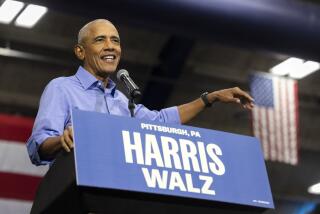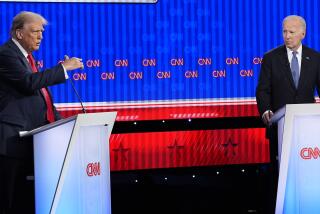Bush Steps Up Attack on Clinton’s ‘Pattern of Deception,’ Draft Record : Politics: The President also lashes out at college-age hecklers, calling them ‘draft dodgers.’ He unveils new insurance proposal.
- Share via
EDISON, N.J. — President Bush on Friday opened a hoarse-voiced new attack against what he called Arkansas Gov. Bill Clinton’s repeated “deception” and lashed out angrily at college-age hecklers, calling them “draft dodgers.”
In the speech, Bush suggested for the first time that Clinton had evaded the Vietnam War-era draft, rather than merely avoiding it.
After muffling his criticism of Clinton in Thursday night’s talk-show-style debate, he seemed determined not to let another day pass without casting new doubt on his rival’s character.
“You are familiar with Gov. Clinton’s stories on what he did to evade the draft,” Bush charged. “He still has not leveled with the American people. He still has not told the truth.”
The White House had billed the address as an opportunity for Bush to unveil a new proposal he said could cut the cost of the average American’s auto insurance premiums by 20% to 30%. But Bush devoted only a few sentences to that plan before swerving back to attacks on what he said half a dozen times was Clinton’s “pattern of deception.”
Bush also accused Clinton of being less than straightforward in his stance on congressional term limits, school choice and economic policy. Citing an account in Friday’s editions of The Times, he charged that the Democratic presidential nominee was disguising a plan to revise his economic program to include “billions of dollars more in new spending.”
The Times’ story reported that Clinton was considering additional federal spending and expanded tax cuts if he wins next month’s election.
Bush’s suggestion that Clinton had evaded the draft in effect accused the Democrat of a criminal offense. While Clinton has given conflicting accounts of the steps he took to avoid the draft, there is no evidence that he broke any laws in avoiding military service.
When a youthful group of Clinton supporters began to boo and chanted anti-Bush remarks, the President appeared rattled and lashed out in evident frustration.
“I wish these draft dodgers would shut up so I can finish my speech. It’s pathetic,” he said, adding: “Where was Bill?”
The United States halted its military draft in 1973, about the time some of the college-age hecklers were born. Asked about Bush’s remarks about Clinton and the protesters, campaign spokeswoman Torie Clarke would only say: “I’ll let the President’s words speak for themselves.”
While he pressed the attack, Bush sounded weary throughout the 17-minute address at an outdoor rally of about 1,000 people at Middlesex County College. He also seemed unusually distracted by the several dozen protesters in the crowd.
He sought to draw inspiration from the come-from-behind performance of the Atlanta Braves in this week’s National League championship series.
“Politics is like baseball,” he insisted, “it ain’t over until the last batter swings. And we are going to win this election.”
But he had to pause frequently as the hecklers interrupted. He abruptly broke away from a prepared passage about his auto-insurance reform plan to insist that the election had to do mostly with trust.
“We’ve had presidents from the South and from the North,” he said later. “Presidents who were rich, presidents who were poor. But rich or poor, Southern or Northern, you must have integrity. And that’s what it takes to lead this great land.”
The White House issued a detailed fact sheet outlining Bush’s insurance proposal, which, if enacted by Congress, would force insurance companies to create a separate, cheaper class of auto insurance for Americans willing to forgo what is now a common-law right to claim damages for pain and suffering.
Under the plan, Americans who waived their right to sue for pain and suffering would be insulated from such non-economic damage claims from other motorists. Because pain-and-suffering claims are estimated to account for about 25% of insurance claims, the White House estimated that the proposal would lead to premium reductions of between 20% and 30% for a nationwide savings of between $20 billion and $30 billion.
The White House, which hastily completed work on the proposal as part of a wider effort to maximize the number of its domestic initiatives, at first sought to portray the proposal as a “tremendous tax break.”
But an Administration official who briefed reporters about the initiative later backed away from that assertion, acknowledging that while American drivers are required to pay for auto insurance, their premiums cannot be considered a tax.
Those motorists who chose not to waive their right to claim pain-and-suffering damages would retain their coverage under the current tort liability system. All motorists would retain the right to sue for pain and suffering caused by intoxicated or criminally negligent drivers.
More to Read
Get the L.A. Times Politics newsletter
Deeply reported insights into legislation, politics and policy from Sacramento, Washington and beyond. In your inbox twice per week.
You may occasionally receive promotional content from the Los Angeles Times.










